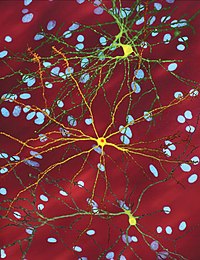
Influence of process parameters on hydrothermal modification of soybean residue: Insight into the nutrient, solid biofuel, and thermal properties of hydrochars.
Sign Up to like & getrecommendations! Published in 2021 at "Journal of environmental management"
DOI: 10.1016/j.jenvman.2021.111981
Abstract: Soybean (SB) solid residue after oil extraction was investigated in a hydrothermal modification process to provide an eco-friendly solution to SB solid waste disposal for an actual environmental management effort. SB hydrochars (HCs) were derived… read more here.
Keywords: soybean; hydrothermal modification; htt mhtt; process ... See more keywords

Polyglutamine-Specific Gold Nanoparticle Complex Alleviates Mutant Huntingtin-Induced Toxicity.
Sign Up to like & getrecommendations! Published in 2021 at "ACS applied materials & interfaces"
DOI: 10.1021/acsami.1c18754
Abstract: Huntington's disease (HD) belongs to protein misfolding disorders associated with polyglutamine (polyQ)-rich mutant huntingtin (mHtt) protein inclusions. Currently, it is indicated that the aggregation of polyQ-rich mHtt participates in neuronal toxicity and dysfunction. Here, we… read more here.
Keywords: toxicity; jld1; polyglutamine specific; mutant huntingtin ... See more keywords

Deletion of SUMO1 attenuates behavioral and anatomical deficits by regulating autophagic activities in Huntington disease
Sign Up to like & getrecommendations! Published in 2022 at "Proceedings of the National Academy of Sciences of the United States of America"
DOI: 10.1073/pnas.2107187119
Abstract: Significance SUMO protein can decorate other proteins via a process called SUMOylation that can regulate toxicity of proteins linked to neurodegenerative diseases. The mutant huntingtin (mHTT) protein in Huntington disease (HD) degenerates nerve cells, and… read more here.
Keywords: deletion; huntington disease; mhtt; sumo1 ... See more keywords

A prion-like domain of TFEB mediates the co-aggregation of TFEB and mHTT
Sign Up to like & getrecommendations! Published in 2022 at "Autophagy"
DOI: 10.1080/15548627.2022.2083857
Abstract: ABSTRACT The aggregation of mutant HTT (huntingtin; mHTT) is a hallmark of Huntington disease (HD). mHTT aggregates interact and sequester dozens of proteins and affect diverse key cellular functions. Here we report that TFEB (transcription… read more here.
Keywords: tfeb; aggregation; prion like; mhtt ... See more keywords

Therapeutic reversal of Huntington’s disease by in vivo self-assembled siRNAs
Sign Up to like & getrecommendations! Published in 2021 at "Brain"
DOI: 10.1093/brain/awab354
Abstract: Abstract Huntington’s disease is an autosomal-dominant neurodegenerative disease caused by CAG expansion in exon 1 of the huntingtin (HTT) gene. Since mutant huntingtin (mHTT) protein is the root cause of Huntington’s disease, oligonucleotide-based therapeutic approaches… read more here.
Keywords: huntington disease; vivo; self; disease ... See more keywords

Nemo-like Kinase Reduces Mutant Huntingtin Levels and Mitigates Huntington's Disease.
Sign Up to like & getrecommendations! Published in 2020 at "Human molecular genetics"
DOI: 10.1093/hmg/ddaa061
Abstract: Nemo-like kinase (NLK), an evolutionarily conserved serine/threonine kinase, is highly expressed in the brain, but its function in the adult brain remains not well understood. In this study, we identify NLK as an interactor of… read more here.
Keywords: like kinase; kinase; mhtt; reduces mutant ... See more keywords

Mutant huntingtin reduction in astrocytes slows disease progression in the BACHD conditional Huntington's disease mouse model
Sign Up to like & getrecommendations! Published in 2019 at "Human Molecular Genetics"
DOI: 10.1093/hmg/ddy363
Abstract: Abstract Neuronal and non‐neuronal cells express the huntingtin (HTT) protein, yet neurodegeneration in Huntington's disease (HD) is largely selective, affecting most prominently striatal medium spiny neurons and cortical pyramidal neurons. Selective toxicity of full‐length human… read more here.
Keywords: bachd gfap; disease; mice; gfap creert2 ... See more keywords

Benefits of global mutant huntingtin lowering diminish over time in a Huntington’s disease mouse model
Sign Up to like & getrecommendations! Published in 2022 at "JCI Insight"
DOI: 10.1101/2022.05.17.492356
Abstract: We have developed a novel inducible Huntington’s disease (HD) mouse model that allows temporal control of whole-body allele-specific mutant Huntingtin (mHtt) expression. We asked whether moderate global lowering of mHtt (∼50%) was sufficient for long-term… read more here.
Keywords: disease; mhtt; model; months age ... See more keywords

Development of a ligand for in vivo imaging of mutant huntingtin in Huntington’s disease
Sign Up to like & getrecommendations! Published in 2022 at "Science Translational Medicine"
DOI: 10.1126/scitranslmed.abm3682
Abstract: Huntington’s disease (HD) is a dominantly inherited neurodegenerative disorder caused by a CAG trinucleotide expansion in the huntingtin (HTT) gene that encodes the pathologic mutant HTT (mHTT) protein with an expanded polyglutamine (polyQ) tract. Whereas… read more here.
Keywords: development; huntington disease; disease; brain ... See more keywords

Preventing mutant huntingtin proteolysis and intermittent fasting promote autophagy in models of Huntington disease
Sign Up to like & getrecommendations! Published in 2018 at "Acta Neuropathologica Communications"
DOI: 10.1186/s40478-018-0518-0
Abstract: Huntington disease (HD) is caused by the expression of mutant huntingtin (mHTT) bearing a polyglutamine expansion. In HD, mHTT accumulation is accompanied by a dysfunction in basal autophagy, which manifests as specific defects in cargo… read more here.
Keywords: mutant huntingtin; huntington disease; autophagy; mhtt ... See more keywords

Meso scale discovery-based assays for the detection of aggregated huntingtin
Sign Up to like & getrecommendations! Published in 2019 at "PLoS ONE"
DOI: 10.1371/journal.pone.0213521
Abstract: Huntington’s disease (HD) is a monogenic neurodegenerative disorder caused by an expansion of the CAG trinucleotide repeat domain in the huntingtin (HTT) gene, leading to an expanded poly-glutamine (polyQ) stretch in the HTT protein. This… read more here.
Keywords: protein; meso scale; htt; scale discovery ... See more keywords